Text
OUR LADY OF GAZA illustration
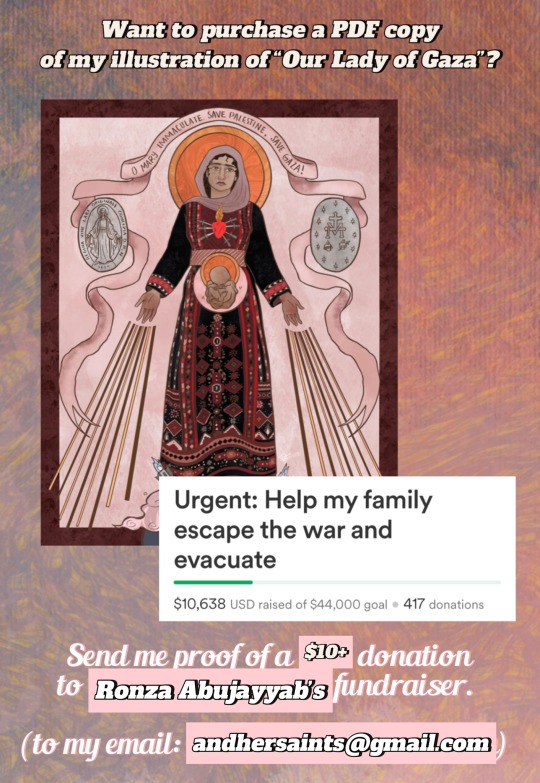
Ronza’s fundraiser ‼️
Ronza is a Palestinian refugee living in Brazil. She is gathering funds to evacuate seven members of her family to Egypt. Including:
Her father, Dr. Sameer Abujayyab. He is 59 years old. He is a doctor and chairman of the non-profit organization, Society of Physically Handicapped People since 1994. He was afflicted with polio at the age of two, so he decided to become a specialized doctor in spinal cord injuries. He returned to Palestine in 1992 and began his work as a doctor.
Her mother, Nawal (59 years-old)
Her grandmother, Refa became a refugee for the first time in 1948. She was 11 years old, now she is 86. Before October 7, she was still strong, but now because of difficulty finding good food, clean water, and her medication, her health has deteriorated. She left her house in agony, crying - Ronza is worried that she can’t bear this severe situation.
Ahmed, Ronza’s youngest brother, is 22 years old. After graduating from University in 2022, he dreamed of building his own startup, and now his goal is just to survive.
Ronza’s other siblings Zuhdi (27) and Lozan (26) are recently graduated Architectural Engineers.
Ronza’s cousin, Doaa (28) is a software engineer. “She is very smart and motivated; this war cost her a lot, her dreams, and her job.”
The costs to evacuate through the Egyptian borders are exorbitant. The expenses of travel for 7 people is $6,000 per person to leave Rafah crossing. They are requesting our help to raise $44,000 to get Ronza’s family out to a safe place.
Again, send me an email ([email protected]) with a $10+ donation to Ronza’s fundraiser, and I will send you a PDF of “Our Lady of Gaza” with no extra cost. This is urgent.
99 notes
·
View notes
Text
ID: drawing on off white or pale pink paper in black ink, with text near the center reading, "If I listen and look closely it seems like God is speaking through everyone and everything." Around the text is a scene with moon and stars in the sky, mountains and clouds below, and three human figures along with plants and a butterfly in the foreground. Yellow lines squiggle along from the moon and starts down around and through the people and plants.
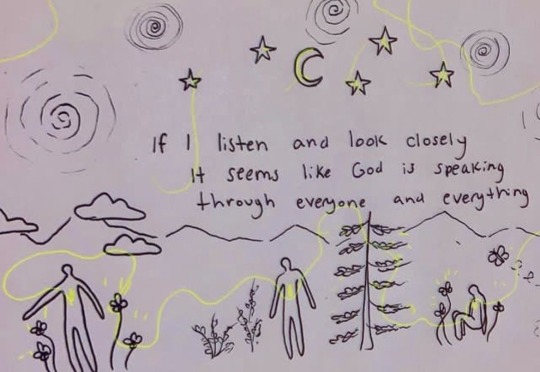
God loves you.
731 notes
·
View notes
Text


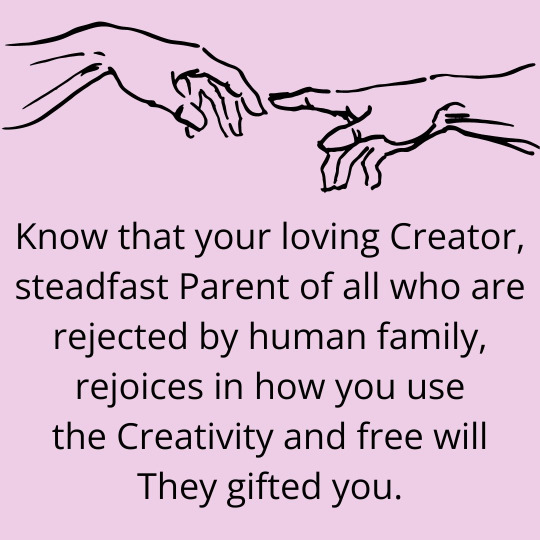


In light of the latest Vatican document* wrapping queerphobia up in “loving” language, I want to remind all my fellow queer & trans Catholics (and Catholic-adjacent folks) that no human words can erase our sacred truth. We are beloved by the God who delights in diversity and calls us good.
If you need some reassurance or resources, wander through my #queer and Catholic tag.
*please be kind to yourself; you don't need to read the document. It's all the usual harmful stuff. If you have read it or know what's in it: I'm sending you so much love.
86 notes
·
View notes
Text
There is still hope. Say it out loud. Palestine will be free. The Palestinian people will celebrate their culture and heritage with each other. We will love and be loved. Do not fall into the trap of despair.
#we have no right to despair as long as there is a single palestinian left who has hope#it's okay to feel grief and rage and fatigue but Do Not Give Up!!#channel those emotions into the fight --by reading palestinian writing & talking to friends & raising money & finding protests & vigils &..#free palestine
142K notes
·
View notes
Note
Hi, I hope you're having a blessed Good Friday and Holy Week. I have a heavy question that may be difficult to answer but I'm hoping you could provide some insight.
How do I lean on Jesus to keep me strong in an abusive situation? I am a closeted trans guy living with alt-right conservative family. I am doing my best to escape the situation but for now I'm stuck. It feels impossible to stay strong knowing these people already hate me, and would hate me even more if they knew my true and actual self. They're supposed to love me, we're family, but they never have. I want to be like Jesus and love them no matter what, and I want to forgive them, but I don't know how. I feel like I can't forgive what they do when it's continuous and they are not sorry. Can you point me in the direction of any verses or lessons that can help me stay strong in the face of pain and hurt?
TW: unaccepting family, conservative family
Ach, so sorry I didn't see this till now. My heart aches for you in this painful situation. I will be holding you in my prayers; may God enfold you in love and courage to get through this time, and send support your way to help you out. If there is anything I can do to help you get out of this current living situation, please let me know.
The fact that you want to show forgiveness to people who have failed to give you the love and care you deserve shows what a big heart and courageous spirit you have. It's a powerful thing to go through hurt and still seek grace even for the ones who hurt you. That kindness is a rare and precious gift; hang on to it for the future, when there will be people in your life who are actually open to receiving and responding to your kindness.
In the meantime, you are correct in pointing out the impossibility of forgiveness when the ones who hurt you are still hurting you, probably have no plans to stop any time soon, and haven't shown any remorse. Despite how mainstream Christianity has watered down the concept of forgiveness into an abstract statement, to a one-off, simple "forgive and forget :)" attitude, that is not actually the kind of forgiveness that Jesus instructs us in.
Mainstream Christian culture has warped forgiveness into a weapon against the wronged, pressuring them to "just move on" so we don't have to live in the discomfort and challenge of dismantling the kind of power dynamics that allow for harm to take place.
Meanwhile when Jesus taught forgiveness, about reconciliation between a wrongdoer and the one they've wronged, his challenge was to the wrongdoer. It was up to them to show remorse and seek forgiveness, to show they'd actually changed by lowering themselves to an equal field with the one wronged so that the harm can never happen again.
In this post, I talk more about Jesus's idea of forgiveness, and discuss how one might "love one's enemies" as Jesus instructs even when forgiving them is not possible.
One thing that has stood out to a lot of people is that when Jesus was going through his greatest agony, being tortured and murdered on a Roman cross, his words of forgiveness are not "I forgive these people who are in the midst of murdering me" but "Father, forgive them." When we are unable to forgive for any reason, that isn't sinful or a sign of weak faith or any such nonsense. It's recognizing the complicated realities of relationship, where reconciliation isn't the responsibility of the person being wronged. And we can let go of any sense of burden on us to do the forgiving — ultimately, that's not our job, but God's.
___
As you survive this difficult situation, I think about Jesus' fraught relationship with his own biological family. His situation was much different from yours — we know his parents did love him, as did his cousin John, and presumably other family members as well. But they didn't always understand him, and they didn't always accept him. They wanted him to be what they expected him to be, not live into who he truly was.
In Mark 3, as Jesus is gaining steam as a teacher and healer, some of his family gets worried about the fame he's gaining — they say, "he's out of his mind!" and seek to "seize control of him." They think what he preaches is some kind of mental illness, and they're either embarrassed of or scared for him. Jesus, come back home! What will people think?? Don't you know what they're saying about our family??
When people tell Jesus his mother and siblings have arrived, he retorts,
“Who is my mother? Who are my siblings?” Looking around at those seated around him in a circle, he said, “Look, here are my mother and my brothers. Whoever does God’s will is my brother, sister, and mother.”
Jesus recognizes that family is much deeper than blood; that family is about who supports you in your God-given identity and gifts, and helps you grow into the person God created you to be. When biological family fails to do that, your family becomes anyone who does not fail you.
Jesus knew, at least to some extent, some of the pain you are going through in being misunderstood by your own kin. I pray that one day you will be surrounded with an outpouring of love, with people who celebrate all that you are. For now, know that God is that supportive presence holding you close, even when you can't feel Them.
As the psalmist in Psalm 27:10 says, "Even if my father and mother left me all alone, Holy God would take me in." To me, that whole Psalm can be read as a message of encouragement to those currently in the closet — the psalmist experiences God giving them shelter in God's own dwelling place, tucking them away "in a secret place in God's own tent."
One day, you'll be free; for now, I hope you take comfort in knowing God is with you in the closet.
Sending you love and solidarity, anon. May you find moments of joy in the midst of this pain; may God lavish you in love and courage until you're able to leave. <3
19 notes
·
View notes
Text
ID: a photo of a person with long dark hair and facial hair; he is gazing at the viewer with lips parted, a hand raised near his chest, and on his head is a crown of hrt vials interspersed with nails, pointy ends pointing outward. One vial sits above the others, central to the person's forehead, with a sacred heart glued to it. Two additional photos show the crown off the person's head, displayed on a white hat amid white, blue, and pink flowers.
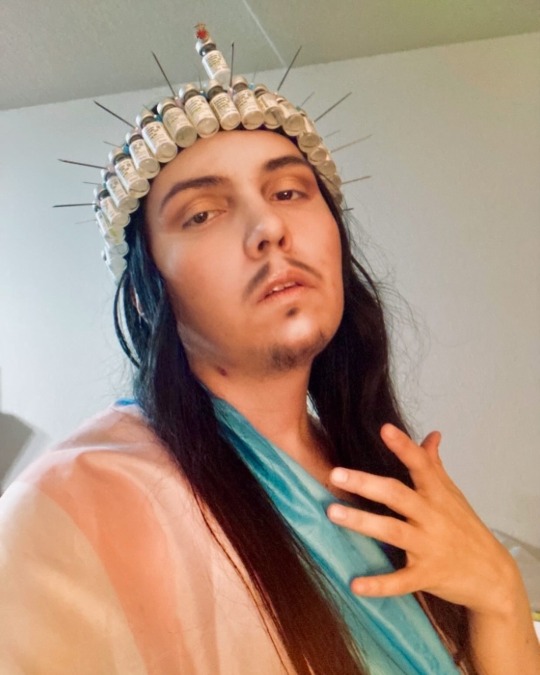


Crown of nearly 3 years on T !
Happy TDOV + Easter !
He/Him
1K notes
·
View notes
Text
ID: two black-and-white drawings of sacred hearts. In the first image, an hrt vial sits on top of the heart, nestled among its flames, and the heart itself has top surgery scars. In the second image, two hands reach around the heart to administer an injection into it, presumably of hrt.
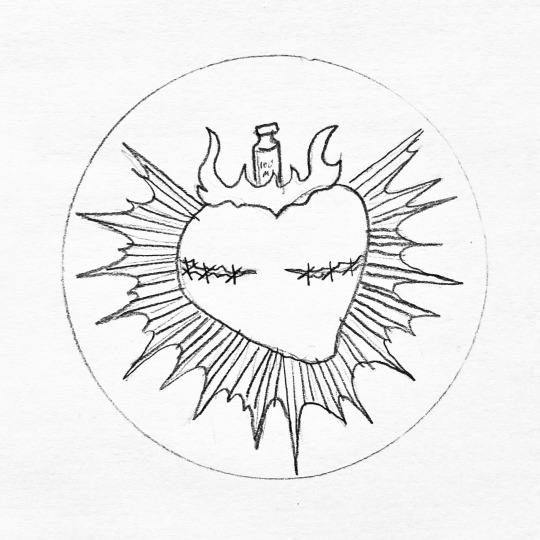
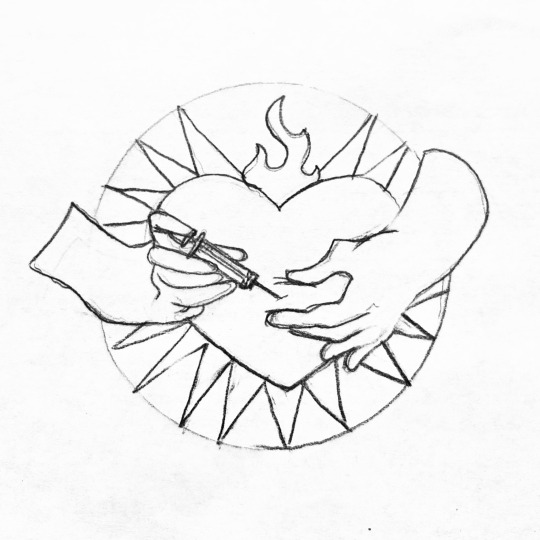
Transition is Sacred
571 notes
·
View notes
Text
@stvksn on ig
143K notes
·
View notes
Text
I also shared this post over on Wordpress.
Today is Easter Sunday.
Today is Trans Day of Visibility.
Today is day 176 of genocide.
This year the lectionary gives us Mark's account of the Resurrection, with its fearful cliffhanger ending — an empty tomb, but Jesus's body missing. And isn't that unresolved note fitting?
In the face of so much suffering across the world, it feels right to be compelled to sit — even on this most jubilant of days — with the poor and disenfranchised in their continued suffering.
Mark's account:
Just days before, the women closest to Jesus witnessed him slowly suffocate to death on a Roman cross. Now, now trudge to his tomb to anoint his corpse — and find the stone rolled away, his body gone. A strange figure inside tells them that Jesus is has risen, and will reunite with them in Galilee.
They respond not with joy, but trembling ekstasis — a sense of being beside yourself, taken out of your own mind with shock. They flee.
The women keep what they've seen and heard to themselves — because their beloved friend outliving execution is just too good to be true. When does fortune ever favor those who languish under Empire's shadow?
Love wins, yet hate still holds us captive.
I'm grateful that Mark's resurrection story is the one many of us are hearing in church this year. His version emphasizes the "already but not yet" experience of God's liberation of which theologians write: Christians believe that in Christ's incarnation — his life, death, and resurrection — all of humanity, all of Creation is already redeemed... and yet, we still experience suffering. The Kin(g)dom is already incoming, but not yet fully manifested.
Like Mark's Gospel with its Easter joy overshadowed by ongoing fear, Trans Day of Visibility is fraught with the tension of, on the one hand, needing to be seen, to be known, to move society from awareness into acceptance into celebration; and, on the other hand, grappling with the increased violence and bigotry that a larger spotlight brings.
The trans community intimately understands the intermingling of life and death, joy and pain.
When we manage to roll back the stones on our tombs of silence and shame, self-loathing and social death, and stride boldly into new, transforming and transformative life — into trans joy! — death still stalks us.
We are blessedly, audaciously free — and we are in constant danger. There are many who would shove us back into our tombs.
And of course, the trans community is by no means alone in experiencing the not-yet-ness of God's Kin(g)dom.
Empire's violence continues to overshadow God's liberation.
The women who came to tend to their beloved dead initially experienced the loss of his body as one more indignity heaped upon them by Empire. Was his torture, their terror, not enough, that even their grief must be trampled upon, his corpse stolen away from them?
The people of Gaza are undergoing such horrors now. Indignity is heaped on indignity as they are bombed, assaulted, terrorized, starved, mocked. They are not given a moment's rest to tend to their dead. They are not permitted to celebrate Easter's joy as they deserve. They are forced to break their Ramadan fasts with little more than grass.
Those of us who reside in the imperial core — as I do as a white Christian in the United States — must not look away from the violence our leaders are funding, enabling, justifying.
We must not celebrate God's all-encompassing redemption without also bearing witness to the ways that liberation is not yet experienced by so many across the world.
This Easter, I pray for a free Palestine. I pray for an end to Western Empire, the severing of all its toxic tendrils holding the whole earth in a death grip.
I pray that faith communities will commit and recommit themselves to helping roll the stones of hate and fear away — and to eroding those stones into nothing, so they cannot be used to crush us once we've stepped into new life.
I pray for joy so vibrant it washes fear away, disintegrates all hatred into awe.
In the meantime, I pray for the energy and courage to bear witness to suffering; for the wisdom for each of us to discern our part in easing pain; for God's Spirit to reveal Xirself to and among the world's despised, over and over — till God's Kin(g)dom comes in full at last.
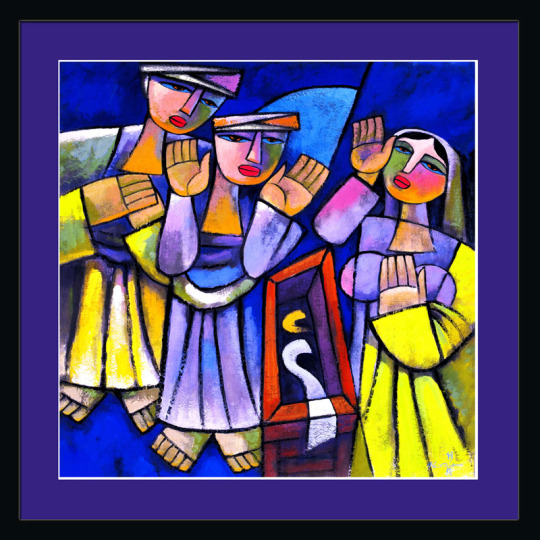
"The Empty Tomb" by artist He Qi.
44 notes
·
View notes
Text
One way to understand Christ’s transfiguration is to see Jesus as “a template for other transfigured, transfiguring bodies,” including transgender persons. Cary Howie, a professor at Cornell who writes extensively on gender and sexuality, broaches this idea in his essay “On Transfiguration.” In this line of thinking, recognizing transgender persons allows us to better understand Christ’s resurrection because both Jesus and transgender persons are changed, trans-figured, metamorphosized.
Another way to understand the transfiguration is to think about the impact of being transformed. Howie writes:
“To be transfigured is to implicate others in your transfiguration; it is to suggest that ‘luminous glory’ may erupt from, and within, any flesh whatsoever. This implication is part of what makes transfiguration terrifying: no one is untransfigurable, and no one is transfigured alone.”
When we see others and acknowledge their transfiguring bodies, we, too, are transfigured and transformed. And the boundaries between “you” and “me” are dissolved until there is only “us.
...
This year with TDOV and Easter falling on the same day, we are asked: are we willing to be transfigured and transformed by acknowledging our trans siblings as images of God? Are we willing to acknowledge their wounds? When we do so, Jesus is revealed and the mystery of Easter bursts into our lives again.
To our trans siblings:
Forgive us
for the times we didn’t see you,
the times we failed to love you.
With your permission and God’s help,
we will love you more faithfully.
We see you, and our hearts burn.
40 notes
·
View notes
Video
youtube
18 notes
·
View notes
Text
ID: painting of the crucifixion. The sky behind three crosses is gray and stormy, with a little sunlight piercing through to illuminate the ground near the crosses. On the central cross hangs Jesus with brown skin, dark hair, and naked except a white cloth around his waist. Two Roman soldiers stand near his cross. In the foreground, their backs to us and facing Jesus, are Mother Mary and John the apostle. Mary wears gray robes and head covering. John wears red and has shoulder-length curly hair; his arm is around Mary's shoulders. There are some other onlookers to the left side of the image.
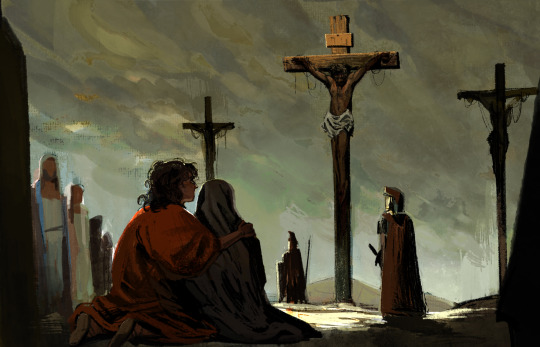
Commission
27K notes
·
View notes
Text
Gaza's Gethsemane
Today is Maundy Thursday, when Christians remember Jesus’s Last Supper, his final meal with his closest friends before his arrest and execution by the Roman Empire.
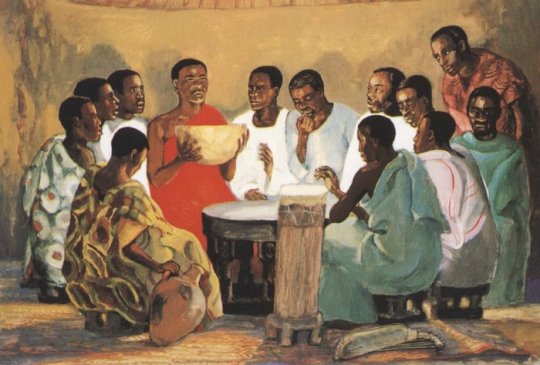
Meanwhile, right now, in Jesus’ own homeland, millions suffer starvation and terror, displacement and death under Western-funded Israeli colonialism and continued military assault. Israel blocks food from reaching them, leaving Palestinians in fear that any "supper" they can scrounge up might be their last.

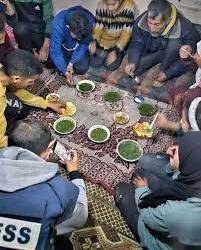
After their meal, Jesus led his friends into the Garden of Gethsemane, where he prayed in anguish, fearing all he was about to endure: criminalization, torture, and a painful public death.

Jesus begs his friends to “stay awake” as he wrestles — just to be present, to make him feel a little less alone. How do we respond to Jesus’ plea by “staying awake” to Palestine’s current agony?
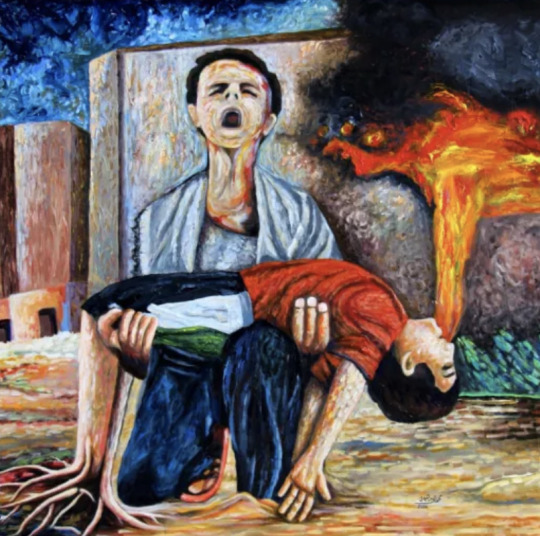
"Cry" (2016) by Mohammed Almadhoun.
That question also leads me to ponder another: how does God join Palestinians in their agony? Where is God in their suffering?
Palestinian Christian Mitri Raheb seeks to answer this question of where God is in his 2015 book Faith in the Face of Empire.
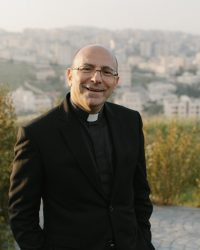

Raheb looks at the history of the Palestinian region, from ancient times to today, as a long chain of different empires — from the Assyrians to the Romans, Ottomans to Western-funded modern Israel.
He says that this long history of occupation is what gave Palestinians the ability to notice God where those in power do not: among the powerless. It is this revelation, Raheb declares, that has empowered Palestinians — Jewish, Christian, and Muslim — to survive and resist Empire again and again.
Raheb writes about how in ancient times, the divine was made
“...visible and omnipresent in the empire with shrines and temples that represented not only his glory but also that of the empire. God’s omnipotence and that of the empire were almost interchangeable. He was a victorious God, a fitting deity for a victorious empire.
At the other end of the spectrum there was the God of the people of Palestine, whose tiny territory resembled a corridor in Middle Eastern geography. ...This God was a loser. He lost almost all wars, and his people were forced to pay the price of those defeats. In short, this God did not appear to be up to the challenge of the various empires. His people in Palestine were forced to hear the mocking voices of their neighbors who taunted them, 'Where is your God?' (Ps 42: 3, 10).
The revelation the people of Palestine received was the ability to spot God where no one else was able to see him. When his people were driven as slaves into Babylon, they witnessed him accompanying them. When his capital, Jerusalem, was destroyed and his temple plundered, they saw him there. When his people were defeated, he was also present. The salient feature of this God was that he didn’t run away when his people faced their destiny but remained with them, showing solidarity and choosing to share their destiny.
Consequently and ultimately, Jesus revealed this God on the cross, in a situation of terrible agony and pain, when he was brutally crushed by the empire and hung like a rebellious freedom fighter. The people of Palestine could then say with great certainty [that their God] ‘in every respect has been tested as we are’ (Heb 4:15).
For the people of Palestine this meant that defeat in the face of the empire was not an ultimate defeat. It meant that after the country was devastated by the Babylonians, when everything seemed to be lost, a new beginning was possible. Even when the dwelling place of God was destroyed, God survived that destruction, developing in response a dwelling that was indestructible. And when Jesus cried on the cross, “My God, my God, why have you forsaken me?” (Mk 15:34), that soul-rending plea was just the prelude to the resurrection…”
It is this revelation that God sides against empire, Raheb continues, that keeps the Palestinian spirit alive through horrible oppression. Though the world may call such faith foolish — how can you believe God is with you and that God will have the final say, when all evidence points to your abandonment and defeat? — it is wisdom to the oppressed. Raheb describes how this wisdom feeds Palestinian resistance, over and over across the millennia:
The art of survival and starting anew is a highly developed form of expression in Palestine, and one I see daily. People’s lives, businesses, and education are interrupted by wars and the aftermath of wars over and over again, and yet I witness people refusing to give up, taking a deep breath, and beginning again. Logically, it is foolish, and yet there is deep wisdom in such a course of action.
I’m often asked by visitors how I can keep going. Everything seems to be lost, the land “settled” by Israel, the wall suffocating Palestinian land and spirit, the world silent, and hope almost gone.”
Raheb's answer to them is that God’s presence in and among the suffering, and God’s promised resurrection, of renewal in the face of all terror and death, is what keeps him and his people going.
As we enter into these final days of Lent, I pray for hearts and minds opened to witnessing God’s solidarity with and resurrection for Palestinians suffering imperial brutality. I pray that the Palestinians will survive as they always have — “afflicted in every way, but not crushed; perplexed, but not driven to despair; persecuted, but not forsaken; struck down, but not destroyed” (2 Cor 4:8–9).
90 notes
·
View notes
Text
Palm Sunday Was a Pride Parade
A reflection by K Kriesel, shared with their permission.
Rev. Winnie Varghese preached on Palm Sunday a decade ago "When there was a parade [in Jesus's time], it was Rome coming in to show them they were conquered, that their God had been humiliated, that they would never be free. And Jesus comes in looking like David... This is not a bunch of people thinking resurrection comes at the end of this week."
Each Palm Sunday we celebrate the Lenten Pride parade - the one without corporate sponsorship. While everyone lays palms down, they form a can-can line and sing "Hosanna to the son of David! We are the Stonewall girls! Blessed is he who comes in the name of the Lord! We wear our hair in curls! Hosanna in the highest!"
Irreverence in the face of somber Empire. A parade that says "you might extract taxes from us but you don't own us. You might put your soldiers on this land but it's not your land." After all, a “Lord” owns land/labor so those who laid down palms were very clear about who they were celebrating, and it wasn’t the Roman Empire.
Within Holy Week we have a sharp pivot from celebratory procession to an unjust execution. This clash in tone is not unlike switching from June 30 to July 1, when the thirteen colonies replace the rainbow; Empire doesn’t care who you celebrate, it exerts power. The wheel of Empire crushed Jesus’ followers just days after they celebrated His arrival, and it continues to crush us.
We need the camp of Palm Sunday, to lay down bedazzled palms and sequins-covered cloaks. When church/state pass laws to restrict us & to protect those who harm us, irreverence shows we won’t be touched at our core. Don your septum piercing and laugh in the face of fear!
In John’s gospel there were 2 angels inside the tomb, they were Trixie Mattel & Katya Zamolodchikova and the sound of the stone being rolled away was UNHhhh. When Mary Magdalene tried to embrace the risen Christ, Jesus saith unto her “touch me not, for my nails are not yet dry.” 💅🏻
Find more of K's art and words at kkriesel.com or on Instagram at kkrieselart. You can also hear my podcast interview with them here.
76 notes
·
View notes
Text
Palm Sunday Was a Pride Parade
A reflection by K Kriesel, shared with their permission.
Rev. Winnie Varghese preached on Palm Sunday a decade ago "When there was a parade [in Jesus's time], it was Rome coming in to show them they were conquered, that their God had been humiliated, that they would never be free. And Jesus comes in looking like David... This is not a bunch of people thinking resurrection comes at the end of this week."
Each Palm Sunday we celebrate the Lenten Pride parade - the one without corporate sponsorship. While everyone lays palms down, they form a can-can line and sing "Hosanna to the son of David! We are the Stonewall girls! Blessed is he who comes in the name of the Lord! We wear our hair in curls! Hosanna in the highest!"
Irreverence in the face of somber Empire. A parade that says "you might extract taxes from us but you don't own us. You might put your soldiers on this land but it's not your land." After all, a “Lord” owns land/labor so those who laid down palms were very clear about who they were celebrating, and it wasn’t the Roman Empire.
Within Holy Week we have a sharp pivot from celebratory procession to an unjust execution. This clash in tone is not unlike switching from June 30 to July 1, when the thirteen colonies replace the rainbow; Empire doesn’t care who you celebrate, it exerts power. The wheel of Empire crushed Jesus’ followers just days after they celebrated His arrival, and it continues to crush us.
We need the camp of Palm Sunday, to lay down bedazzled palms and sequins-covered cloaks. When church/state pass laws to restrict us & to protect those who harm us, irreverence shows we won’t be touched at our core. Don your septum piercing and laugh in the face of fear!
In John’s gospel there were 2 angels inside the tomb, they were Trixie Mattel & Katya Zamolodchikova and the sound of the stone being rolled away was UNHhhh. When Mary Magdalene tried to embrace the risen Christ, Jesus saith unto her “touch me not, for my nails are not yet dry.” 💅🏻
Find more of K's art and words at kkriesel.com or on Instagram at kkrieselart. You can also hear my podcast interview with them here.
76 notes
·
View notes
Text

#remember that Hosanna means 'save us!!'#the first palm sunday was a protest against imperial powers#palm sunday#gaza#palestine
2K notes
·
View notes
Note
Sorry if this is a heavy question but I don't know where else to go. Is it true that you will go to hell if you commit suicide? And if not, how can I be sure? Completely sure?
I don't ask for bad reasons, just that I have a degenerative disease and there will eventually come a point when i'm still alive but can no longer live at all. Hopefully that's still a long ways away but I want to have a choice when that time comes, rather than existing for potentially years with severe pain and no joy. But can I do that without condemning myself to an eternity of the same?
CW: suicide, hell, degenerative disease, euthanasia
Hi there, anon. I fully believe that a just and loving God would never condemn anyone who is going through the kind of internal and external struggle that leads to suicide.
I have a long article on Medium where I explore instances of suicide ideation in scripture that I recommend to you. Overall, I conclude that condemnation of suicide is not present in the Bible: the few instances of completed suicide are presented pretty neutrally; and the many instances of suicide ideation elicit God's compassion, not condemnation.
Throughout scripture, God’s response to depressed and suicidal people is not condemnation, but
validation of their experience;
removal of the factors that make them depressed/suicidal; and
helping them access a more abundant life.
When it comes to your degenerative disease, that second point might sound absurd or even offensive. I do not tout cureism; I'm absolutely not telling you to put on rose-colored lenses and pretend your disease will magically go away. While it's possible that medicine may advance in your lifetime to help prolong your life or ease your pain, it sounds like you're very aware of the realities of your disease and the more likely path it will take.
But while I don't believe in a magical genie God who vanishes away all pain and illness in our lives, I do believe in a God who enters into our suffering. A God who, when removal of pain is not possible, endures that pain with us; and who guides us into community that will support us in all that we go through. And who, yes, ultimately brings us into abundant life — partially in this life, fully in the next.
___
Along with biblical support for God's compassion for suicidal persons, Christian denominations that used to promote the idea that suicide leads to damnation have since revised those views.
As our collective understandings of mental health have developed over the last century or so, it's become more obvious even to the most traditional groups (e.g. the Catholic Church) that claiming that people who die by suicide go straight to hell is an extremely callous and unjust view and frankly, a grievous form of victim-blaming.
Instead, while emphasizing the seriousness of suicide and urging suicidal persons to seek professional assistance, most churches now assure the loved ones of those who have died by suicide that God's mercy and love cover all things. And those churches with a solid social justice mindset invest their resources in removing the societal factors that lead someone to suicide, rather than blaming the suicidal.
___
I hope this helps ease your fears somewhat, anon. You may also find encouragement in my #hell tag, where I frequently talk about how I don't believe in hell at all. God's will for all of us is relationship and thriving; and when I believe anything at all I do believe the words Jesus taught us: "thy will be done, on earth as it is in heaven." Suffering and death will not have the last word; punitive "justice" will not have the last word; God's restorative justice and all-embracing love will.
Wishing you as slow a progression in your degenerative disease as possible. And no matter where this life takes you, I pray that you find your people, who will support you and advocate for you, laugh and weep with you, learn and live and love with you; and that you feel God's deep, abiding love, holding you close through all things.
34 notes
·
View notes